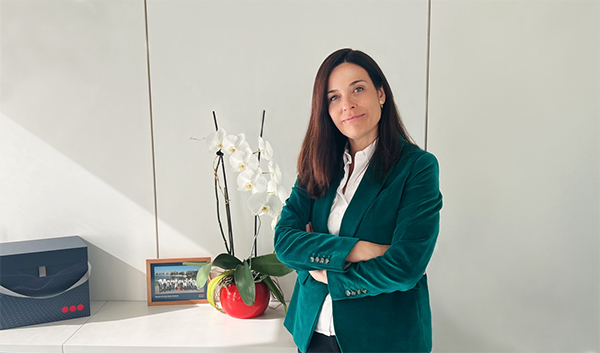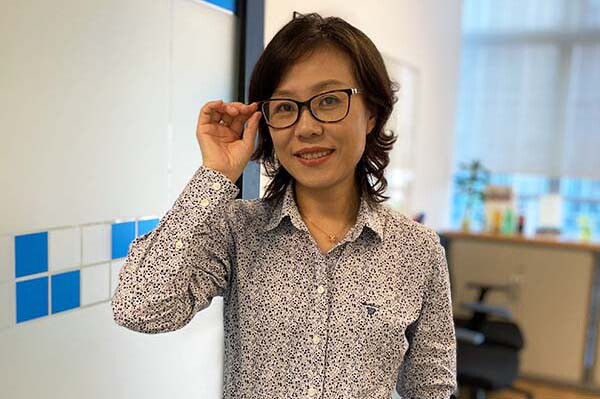
This blog is part of our Breaking Barriers series that celebrates the remarkable women leaders who play a pivotal role in shaping Securitas into the company it is today.
Meet Arantxa Lafuente, People and Sustainability Leader for Securitas Ibero-America. With extensive local and international experience in talent management across diverse industries such as infrastructure, services, communications, and logistics, Arantxa brings a wealth of knowledge to her role. She holds a bachelor's degree in law and a master's in human resources management, and she is also an executive coach. Passionate about people development, Arantxa believes in education as a key tool for transforming the world.
Residing in Madrid, Spain, with her husband and two children, Arantxa’s ultimate goal is to drive sustainability and foster a culture of excellence within Securitas Ibero-America through innovative HR strategies and sustainable practices. Continue reading for her insights and inspiration.
Arantxa’s Q&A on careers, leadership, and sustainability
What led you to the security industry?
I have always been drawn to people-centered companies, having previously worked in services industries such as facility management, citizens services, and communications consulting. Joining Securitas felt like a natural progression for me. Although I had never worked in the security industry before, Securitas is a service- and customer-oriented company that puts people at the center of its strategy. This focus on people made it an ideal place for me to make an impact, facing new challenges and opportunities.
Now that I’ve been with the company for two years, I can truly say Securitas is its people, and the people are Securitas.
On a more personal level, working in the security sector has made me realize the importance of security. While I am fortunate to live in a safe country, it has highlighted that not everyone shares this reality. Being part of an organization that plays a role in making the world a safer place allows me to forge a deeper connection with my work and our purpose, filling me with a deep sense of pride and gratitude.
How do you help other women to lead? What advice do you have for aspiring leaders?
It is critical to have a clear vision of who you are, your strengths and weaknesses, what you want to achieve, how you can contribute to the business, and the types of roles you would like to perform. This self-awareness allows you to assess your strengths honestly and create a plan to address any gaps. I advise aspiring leaders to seek feedback, find a mentor or coach, and actively work on their development goals.
A few years ago, I came across the P.I.E. model by Harvey J. Coleman in his book “Empowering Yourself: The Organizational Game Revealed.” Coleman identifies three crucial elements – performance, image, and exposure (P.I.E.) – that collectively shape career success. To foster career progression, it's essential to go beyond just performance. According to Coleman, while delivering exceptional performance is vital, it's equally important to cultivate a strong image and manage your exposure so the right people recognize your capabilities.
Women often focus heavily on the "P" in Performance, striving for promotions, but sometimes neglect the other two critical aspects. The "self-promotion" gap, which refers to the difference in effort that women put into showcasing their achievements compared to men, is reported to be as high as 33%, according to studies published in the Harvard Business Review.
One of my fundamental pieces of advice is for women to acknowledge the importance of their image (how others perceive your excellence) and exposure, which includes strategic networking.
To support women in their professional journey, Securitas Ibero-America has launched the first edition of a Women's Leadership Development Program named "Lidera Securitas." The program is designed to help women create a career vision and enhance their skills, with a distinct focus on leadership, personal branding, communication, and more.
How have others encouraged you throughout your career?
I've been fortunate to collaborate with remarkable individuals – leaders, mentors, colleagues, and team members – who have significantly contributed to my growth and inspired me in various ways.
The most impactful influencers in my career were those who not only motivated me but also instilled courage, self-belief, and the importance of expressing my thoughts and continuing to learn and grow.
While I've worked with brilliant minds who taught me about business and people management, what stood out was their emphasis on working with sound ethical judgment. Both personally and professionally, I’ve learned the importance of surrounding myself with skilled professionals who also have strong integrity. When assembling a team, I prioritize this aspect, understanding that in our interconnected world, we need people who are good, bold, innovative, unafraid to think outside the conventional boundaries, and committed to making a positive impact.
At Securitas, we view diversity and inclusion as integral to our sustainability focus. How do you see the relationship between diversity, inclusion, and sustainability, and how do you incorporate these principles into your leadership approach?
Diversity and inclusion are essential pillars of our sustainability strategy. In a company like Securitas with more than 340,000 people with different backgrounds, stories, nationalities, genders, ethnicities, ages... diversity is a reality. We believe that diversity and inclusion make us better and open the door to greater creativity and innovation. Diverse teams are important to our long-term success and sustainable growth, and we work every day to create an inclusive environment and to dismantle some biases that still exist around our industry.
A fairly common belief in society is that security is an exclusively male field, but the truth is that there are thousands of women at Securitas working in roles ranging from risk assessment, guarding, installation and maintenance of security equipment, development of technological solutions, to senior management roles.
Another belief is that guarding roles can’t be performed by people with disabilities. We dismantle this belief with data: In countries such as Colombia, Uruguay, and Chile, there are already more than 200 people who are part of our Inclusive Surveillance Program, an initiative that in Colombia has been recognized by the United Nations Global Compact.
But in order to move forward, we must start with ourselves. All of us have our own biases – deep and unconscious beliefs – and in order to learn how to manage them, we have invested in training programs for all our staff around the globe.
By integrating diversity and inclusion into our sustainability efforts, we create a more resilient and socially responsible organization. This approach not only strengthens our internal culture but also enhances our ability to positively impact the communities we serve, aligning our business objectives with the broader goal of sustainable development.
How can the industry encourage more young women to pursue careers in security and technology?
I believe it’s crucial to highlight our female talent. Showcasing examples of female leadership is an effective way to attract talented women. Naturally, this needs to be accompanied by additional measures, including educational initiatives, mentorships, networking opportunities, and challenging stereotypes.





